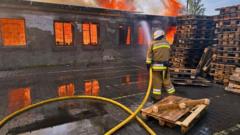The Ukrainian public expresses doubt over a proposed three-day ceasefire from Russia, coinciding with Victory Day. President Zelensky denounces it as a "theatrical show," while many civilians express skepticism rooted in previous violations. Calls for genuine peace negotiations persist amid ongoing conflict.
Ukrainians Skeptical of Russia's Proposed Ceasefire Amid Intensifying Conflict

Ukrainians Skeptical of Russia's Proposed Ceasefire Amid Intensifying Conflict
As Russia announces a three-day pause in hostilities to commemorate Victory Day, many Ukrainians label it a mere facade, questioning the sincerity of Moscow's intentions.
In a move met with skepticism from many Ukrainians, Russia recently declared a three-day ceasefire beginning Wednesday night, coinciding with the 80th anniversary of the end of World War Two in Europe, known as Victory Day. President Volodymyr Zelensky mocked the initiative, labeling it a “theatrical show” that fails to address the underlying issues of the ongoing conflict.
The ceasefire proposal, put forth by President Vladimir Putin, was seen as insincere, particularly after Russia rejected a more comprehensive 30-day ceasefire and negotiation plan proposed by the Trump administration, which Ukraine accepted. Zelensky firmly rejected this unilateral ceasefire, emphasizing that Ukraine would not ensure the safety of any military parade scheduled for May 9 in Moscow.
In Ukraine, public trust in Russia is profoundly low, with polls indicating that around 95% of the population remains distrustful. "I don’t believe there will be any ceasefire," remarked Tetyana Kondratenko, a shopkeeper from Sumy, noting that bombardments have only intensified. She recalled how a prior ceasefire during Easter was used by Russian forces to escalate their military presence and attacks.
Officials in Ukraine have yet to confirm if they will alter their military actions during the three-day proposal. An official from the presidential office stated, “We’ll see.” Despite the proposed pause, Ukrainian troops remained vigilant against any possible Russian provocations.
While some residents like Antonina Sienina expressed a desire for a brief respite from violence, having personally suffered losses due to the war, the lack of guarantees for safety and sovereignty raised further reservations about Putin's offer. "Any ceasefire worth agreeing to should come with solid guarantees for Ukraine's safety," she stated.
Recent drone and missile attacks on Kyiv, resulting in casualties, have further exacerbated fears about the honesty of Russia's plans. Many Ukrainians view the ceasefire not as an opportunity for peace but as a propaganda tactic designed by Russia to shape the narrative both domestically and internationally.
Critics also argue that the communications surrounding the ceasefire aim to present Russia as the dominant force in the conflict. Former Ukrainian Foreign Minister Pavlo Klimkin asserted that the maneuver is designed to send a message of control to the United States and Europe.
Calls for a genuine ceasefire have emerged from various corners of Ukraine, with many citizens enduring exhausting conditions as the conflict persists. Oleksii Kamchatnyi recognized the necessity for life-saving measures, voicing support for a ceasefire despite the risks it entails.
Yet, skepticism persists. People remain wary that the proposed ceasefire is a ploy for Russia to reposition troops and launch simpler maneuvers on the battlefield. Mykhailo Samus, a military analyst, stressed that Ukraine is ready for a sincere ceasefire and would not engage in what he characterizes as “Putin's game” of misdirection.
The ceasefire proposal, put forth by President Vladimir Putin, was seen as insincere, particularly after Russia rejected a more comprehensive 30-day ceasefire and negotiation plan proposed by the Trump administration, which Ukraine accepted. Zelensky firmly rejected this unilateral ceasefire, emphasizing that Ukraine would not ensure the safety of any military parade scheduled for May 9 in Moscow.
In Ukraine, public trust in Russia is profoundly low, with polls indicating that around 95% of the population remains distrustful. "I don’t believe there will be any ceasefire," remarked Tetyana Kondratenko, a shopkeeper from Sumy, noting that bombardments have only intensified. She recalled how a prior ceasefire during Easter was used by Russian forces to escalate their military presence and attacks.
Officials in Ukraine have yet to confirm if they will alter their military actions during the three-day proposal. An official from the presidential office stated, “We’ll see.” Despite the proposed pause, Ukrainian troops remained vigilant against any possible Russian provocations.
While some residents like Antonina Sienina expressed a desire for a brief respite from violence, having personally suffered losses due to the war, the lack of guarantees for safety and sovereignty raised further reservations about Putin's offer. "Any ceasefire worth agreeing to should come with solid guarantees for Ukraine's safety," she stated.
Recent drone and missile attacks on Kyiv, resulting in casualties, have further exacerbated fears about the honesty of Russia's plans. Many Ukrainians view the ceasefire not as an opportunity for peace but as a propaganda tactic designed by Russia to shape the narrative both domestically and internationally.
Critics also argue that the communications surrounding the ceasefire aim to present Russia as the dominant force in the conflict. Former Ukrainian Foreign Minister Pavlo Klimkin asserted that the maneuver is designed to send a message of control to the United States and Europe.
Calls for a genuine ceasefire have emerged from various corners of Ukraine, with many citizens enduring exhausting conditions as the conflict persists. Oleksii Kamchatnyi recognized the necessity for life-saving measures, voicing support for a ceasefire despite the risks it entails.
Yet, skepticism persists. People remain wary that the proposed ceasefire is a ploy for Russia to reposition troops and launch simpler maneuvers on the battlefield. Mykhailo Samus, a military analyst, stressed that Ukraine is ready for a sincere ceasefire and would not engage in what he characterizes as “Putin's game” of misdirection.























